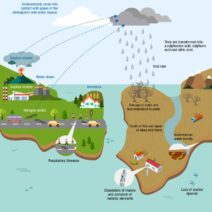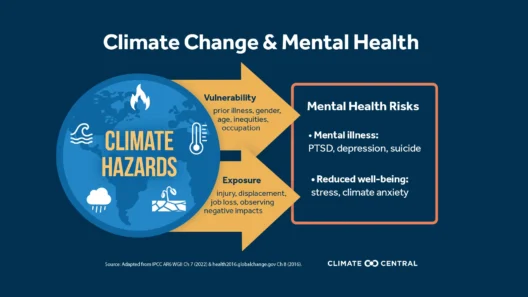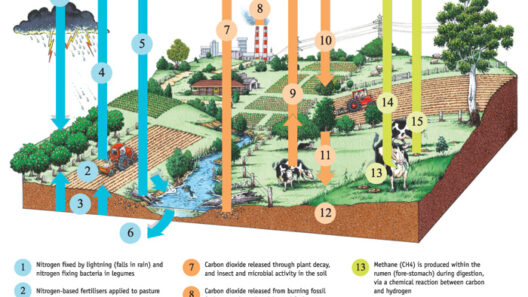Deforestation is one of the most pressing environmental issues of our time, with profound implications for global climate systems. The intersection of trees, carbon, and climate change reveals a complex relationship that merits a thorough examination. As we delve deeper into this pivotal issue, it becomes clear that the eradication of forests is not merely an ecological concern; it is a multifaceted crisis that exacerbates climate change in several significant ways.
Forests play an indispensable role in sequestering carbon dioxide, the primary greenhouse gas driving global warming. Through the process of photosynthesis, trees absorb atmospheric CO2 and store it within their biomass. This natural carbon capture is crucial for regulating the Earth’s climate as it helps to mitigate the greenhouse effect. However, when trees are felled, this stored carbon is released back into the atmosphere, exacerbating the very problem that forests help to mitigate. Indeed, according to various studies, deforestation contributes to about 10% of global greenhouse gas emissions, a staggering amount that highlights the crucial role forests play in our climate system.
Yet, the relationship between deforestation and climate change is not simply a matter of carbon emissions. The loss of trees has far-reaching effects on local and global weather patterns. Trees influence precipitation, humidity, and temperature both on a micro and macro scale. They create a cooling effect through transpiration, where water vapor is released from leaf surfaces, helping to maintain a moderate climate. The removal of forests disrupts these delicate atmospheric balances, frequently leading to regional droughts, altered rainfall patterns, and, ultimately, harsher climate conditions.
Moreover, deforestation has a diabolical tendency to create feedback loops that perpetuate climate change. For instance, the warming climate can lead to increased forest fires, which not only destroy vast areas of forest land but also release copious amounts of carbon previously stored in trees. This scenario presents a pernicious cycle: climate change fuels deforestation through initial disturbances, such as wildfires, and in turn, deforestation exacerbates climate change by releasing more carbon into the atmosphere.
A further examination points to the social dynamics underpinning deforestation. The commodification of forests, primarily for agriculture, logging, and urban expansion, showcases a relentless pursuit of economic gain at the expense of ecological integrity. Particularly in tropical regions, vast tracts of forest are cleared for large-scale agricultural practices—commonly known as palm oil or soy plantations. This not only leads to loss of biodiversity as countless species lose their habitats but also amplifies the socio-economic pressures faced by local communities that depend on forests for their livelihood. The intricate web of dependencies underscores a critical point: deforestation is not merely an environmental issue, but a social one, intertwined with issues of poverty, governance, and sustainability.
Despite the grim narrative surrounding deforestation, it is essential to address the barriers to effective solutions. Policy frameworks face significant challenges, including weak enforcement of environmental laws and the interests of powerful agricultural and industrial lobbies that prioritize short-term profits over long-term sustainability. Even well-intentioned policies, such as reforestation and afforestation initiatives, can sometimes fall short or succeed only partially, often due to inadequate understanding of local ecosystems or the complexity of restoring a biologically diverse forest. Effective climate strategies must recognize and confront these multifaceted obstacles and advocate for legislation that not only protects existing forests but also considers the intricate socio-economic realities faced by communities reliant on forest resources.
The fascination with forests goes beyond their ecological significance. Forests are often portrayed as sanctuaries of biodiversity and resilience, yet their fate is unquestionably linked to human activity. They are a testament to the fragile balance that humans must maintain with the natural world. The philosophical implications of deforestation prompt an essential inquiry: how can societies harmonize economic growth with environmental stewardship in a sustainable manner? These questions remain paramount as humanity grapples with the realities of climate change.
International cooperation will be paramount in addressing deforestation and its contributions to climate change. Existing partnerships, such as the REDD+ mechanism (Reducing Emissions from Deforestation and Forest Degradation), highlight the importance of global efforts in preserving forest ecosystems. Such initiatives must encompass not only carbon trading but also capacity building, investment in alternative livelihoods for communities, and the promotion of sustainable land-use practices. The global community must come together to create a unified front in the battle against deforestation, underscoring its role as a critical element in the fight against climate change.
Ultimately, the urgency to confront deforestation is exceptionally clear. It is not merely a question of protecting trees but a matter of safeguarding the planet’s future. The link between forests and climate change is intricate and irrefutable, a reality that calls for immediate action and significant engagement from all sectors of society. As we advance, an informed and concerted effort to combat deforestation is not just a necessity but an ethical imperative, one that transcends borders and demands the commitment of every individual.




